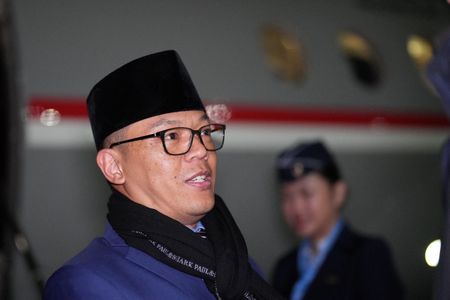By Michael Martina, Ben Blanchard and Yimou Lee
WASHINGTON/TAIPEI (Reuters) -Taiwan may demonstrate it takes Donald Trump’s “protection” money demand seriously with large and early new arms deals, showing it is not looking for a free ride and is determined to show Washington its resolve to spend to defend itself.
Trump, who won a second term as president this week, unnerved democratically governed Taiwan, which is claimed by China, by saying that Taiwan should pay the U.S. for its defence and that it had taken semiconductor business away from America.
“Watch for Taiwan on the defence side to try and start engaging them on a big arms package – to do something significant, very large,” Rupert Hammond-Chambers, president of the U.S.-Taiwan Business Council which helps broker defence exchanges between Washington and Taipei, told Reuters, adding it could come in the first quarter of next year.
“But think of it as a down payment, an attention getter,” he said. “They’ll stack up several big platforms and big buys of munitions.”
The U.S. is already Taiwan’s most important arms supplier, although Taiwan has complained of an order backlog worth some $20 billion. A new order, almost $2 billion of missile systems, was announced last month.
Taiwan, whose government rejects Beijing’s sovereignty claims, has faced repeated military pressure from China, including a new round of war games last month.
Taiwan’s foreign ministry, in a written report to lawmakers on Thursday, said China might try and test the U.S. during the presidential transition with more drills, hacking attacks or other forms of psychological warfare.
One former U.S. official said he assessed it was “highly likely” that Taiwan would move quickly to attempt to broker a major arms deal with the U.S. to get the Trump administration onside and counter any lingering inclination he has that Taiwan fleeced the U.S. on semiconductors.
“They will want to solidify their fealty quickly to lock in Trump’s interest,” the person said of Taiwan, speaking on condition of anonymity to be able to speak freely.
Taiwan’s defence pact with Washington ended in 1979 along with official diplomatic relations, so it does not directly pay for U.S. forces to be based on its soil, unlike Japan and South Korea.
On Thursday, Taiwan Foreign Minister Lin Chia-lung avoided answering questions from reporters on what protection money for the United States might look like, but told lawmakers defence spending, now around 2.5% of GDP, would increase.
“The trend is for it to keep rising,” he said.
Taiwan’s defence ministry referred Reuters to comments on Wednesday by Deputy Defence Minister Po Horng-huei in parliament that Defence Minister Wellington Koo had made it very clear Taiwan’s determination to defend itself will never change.
“It is our responsibility to maintain stability in the Taiwan Strait,” Po said.
FRIENDS OF TAIWAN
Several names being considered for top jobs in the new U.S. administration are people who are strong supporters of Taiwan, including former Secretary of State Mike Pompeo, who after leaving office called for formal diplomatic relations with Taiwan, and former National Security Adviser Robert O’Brien, who visited Taiwan last year.
O’Brien on Wednesday tweeted his thanks to Taiwan President Lai Ching-te for his congratulations to Trump, cheering officials in Taiwan, although Lai’s office said there were no plans for a call between him and Trump.
One Taiwan-based security source, also speaking on condition of anonymity given the sensitivity of the matter, said that if people like O’Brien or Pompeo got top jobs it would be “fantastic” for Taiwan, but that Taiwan also needed to show it took defence spending seriously.
“Trump asking for protection money is probably the jolt Taiwan needs to really ramp up its defence spending,” the official said, adding a new arms deal in the new year would be an excellent way of showing Trump it would do so.
Trump won fans in Taiwan during his first term in office, first by speaking to then-President Tsai Ing-wen shortly after winning election, and then with arms sales, visits by cabinet members to Taipei and a strong line on China.
Vincent Chao, who was spokesperson for Lai’s presidential campaign and is a regular visitor to the United States, said all possible candidates being discussed publicly for Trump’s Secretary of State and defence secretaries are considered “Taiwan friendly”.
“When it comes to Trump, people say it is about what he does, not what he says,” Chao said, referring to Trump’s comments on Taiwan during the campaign. “There’s no need for Taiwanese to worry. We should have confidence.”
(Reporting by Michael Martina, Ben Blanchard and Yimou Lee; Editing by Raju Gopalakrishnan)










